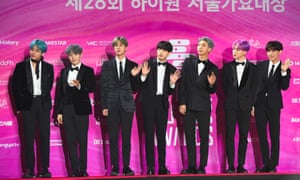
Monster hits by K-pop bands and Spanish-speaking rappers show it’s not necessary to sing in English to conquer the world
A band has attained a certain stature when its “world tour” consists of an imperial sweep through four continents, with just half a dozen concerts in each. The South Korea-based girl group Blackpink are currently midway through just such a jaunt – next month, they arrive in Europe to play six dates (London and Manchester included).
Remarkably, this high-visibility procession is the first time the K-pop quartet have toured outside Korea or Japan; more remarkable still, they’ve released just one album and a scant handful of tracks – and while they’ve made English-language videos, most of their material is in Korean or Japanese. Nonetheless, they’re adored by a worldwide fanbase, for whom language is no barrier. Recent industry figures underline the strength of the global music market, with some suggesting the place of the English language at the forefront of pop is diminishing.
Blackpink, whose most streamed single, Ddu-du Ddu-du, has had 735m views on YouTube, are the latest manifestation of what is looking like a baseline change in how pop is conveyed. Until recently, English was its lingua franca, and to sing in any other language relegated an artist to the second tier, successful only in their own region, unless they had a rare border-crossing novelty hit.
But in 2018 a bubbling linguistic pot came to the boil when worldwide breakthroughs by the K-pop boybands BTS and Monsta X, and Spanish-speaking rapper/singers J Balvin, Ozuna and Bad Bunny, all of whom make a point of performing in their own languages, upended convention. Blackpink’s album became the first by a female K-pop group to reach America’s top 40 chart, and the most streamed song globally of 2018’s last quarter was DJ Snake’s Spanish-language Taki Taki. The idea that the public would listen only if they understood the lyrics? Wrong, it turned out.
What’s more important is the feel of the tune as it spills out of a smartphone, not to mention the relatability of the artist (Ddu-du Ddu-du, for instance, asserts that Blackpink are “pretty and savage”, and if you’re a 13-year-old Blink – as fans call themselves – what’s not to love?). Even without the boost provided by the 40 million Americans who speak Spanish as their first language, Colombian Balvin and Puerto Ricans Ozuna and Bad Bunny would likely have made headway in the US by dint of releasing consistently exciting music. (Though Balvin has been spreading himself thin, collaborating with the likes of Liam Payne and David Guetta on tracks that are more marriages of brands than musical love matches.)
And India’s huge industry could be the next to see its artists claim new territory, writes Tim Ingham of Music Business Worldwide: “Spotify is expected to launch in the territory in the coming weeks, with a heavy focus on striking up relationships with local artists. The firm recently inked a global content licensing deal with India’s biggest label, T-Series, which also happens to be the owner of the world’s second largest YouTube channel, with over 60.5 billion plays of its videos to date.”
So, it’s farewell, then – maybe – to English as pop’s primary force. Perhaps it was inevitable: there are 7.5 billion people in the world, and only 5% – 360 million – are native Anglophones, meaning that it has ben punching far above its weight. The globalisation of pop feels, as do so many current cultural shifts, like a necessary redressing of the balance, and not an unwelcome one: having reviewed sold-out London shows by BTS and Monsta X last year, I can verify that you don’t need to understand Korean to get it. (It helps that their music, and that of Blackpink, is an instantly recognisable tumult of electronic pop with rappy bits – the musica franca of every teenager in the world.)
And yet … not so fast. In listening to music, there are times when, for English speakers, only English will do. Its rhythms and intonations suit particular genres, notably rock and the singer-songwriter strand of indie, where wordplay and apt turns of phrase often crop up. There’s no real substitute, especially in gloomy moments, for listening to some familiar song and feeling that the songwriter knew exactly how you felt when they wrote those twisty little couplets. English might be ceding some of its supremacy, but the music business’s centre of gravity is still the US and the UK, and Anglophone musicians won’t be turfed out of a job for a while yet.
• Caroline Sullivan writes about rock and pop for the Guardian


Nenhum comentário:
Postar um comentário